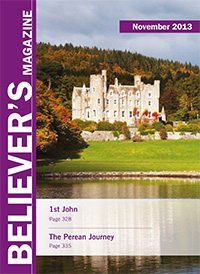The Epistle to the Philippians was written when Paul was under arrest in Rome. Four times in the first chapter he refers to his "bonds" (vv.7,13,14,16), and it is clear that he felt no self-pity. Rather he saw the circumstances around him as the means of preaching Christ (v.15) in the very centre of the empire.
It is also obvious that he did not forget those who had toiled faithfully with him in past days of service in the gospel. To our attention, centuries later, he brings one whose name we do not know, but of whose character he has left us in no doubt. His labour had gained him the distinction of being spoken of as "true yokefellow" (4.3). The apostle knew this faithful servant of the Lord well, and over the centuries this person shines as an example of how we must behave should we claim to be a servant of the Lord Jesus.
The description of the word given by W E Vine is sound: "a yoke, serving to couple two things together, is used…metaphorically, (a) of submission to authority (Mt 11.29-30), of Christ's 'yoke', not simply imparted by Him but shared with Him; (b) of bondage (Acts 15.10 and Gal 5.1) to the Law as a supposed means of salvation; (c) of bond service to masters (1 Tim 6.1)". It is a more intimate term than "fellowworker", but emphasises bearing the weight of a common yoke. In the context of the verse it is clear that Paul regarded this brother as being yoked together with him in the work of "the furtherance of the gospel" (Phil 1.12).
The first feature to note is that this servant of the Lord was a "true" yokefellow - true, genuine and marked by sincerity, not toiling to impress others but seeking to be faithful and pleasing to the Lord. He had no ulterior motive. His desire at all times was for the Word of God to be spread and the saints to be edified. May we all seek to be "true" as was he.
The second characteristic of this faithful servant was that he could serve and be yoked with another, not with the failure of character of seeking always to work alone, unable to co-operate with others. It was for them to bear the weight of a common yoke. How vital it is in the assembly that the saints should work in harmony. "True yokefellow" did not work by himself; he understood how vital is the fellowship of others. Remember that when the disciples were sent out they went two by two so that they could help and encourage each other.
The third distinction that marked this follower of the Lord was that he had wisdom. He understood how to handle those who needed support. Paul requests him to "help those women which laboured with me in the gospel". It may be that the two women were in fact Euodias and Syntyche (v.2) who appear to have had differences, or it may be others who required help in some other way. It is noteworthy that at Philippi it was women who were first to hear the gospel and it was Lydia who was the first to believe (Acts 16.12-15). It may be that the Adversary was working to seek to destroy the unity amongst the women who had put their trust in the gospel. However, there is some conjecture in that statement. It may be simply that "those women" needed what is often required - some support as they sought to further the gospel.
The fourth feature is that he was not a talebearer. He would not pass on to others what he had learned as he sought to give help. He was able to control his tongue and his temper and, therefore, to be known as being trustworthy.
Paul knew, as he wrote, that "true yokefellow" was a reliable servant of the Lord. He would not fail in the commission given to him; he would not take sides; he would not gossip about what he was doing. It was not for him to pry into what was not his business. Such servants of the Lord are required today - those with the wisdom and compassion that is so needed. Little wonder that the imprisoned apostle could depend on his "true yokefellow".









